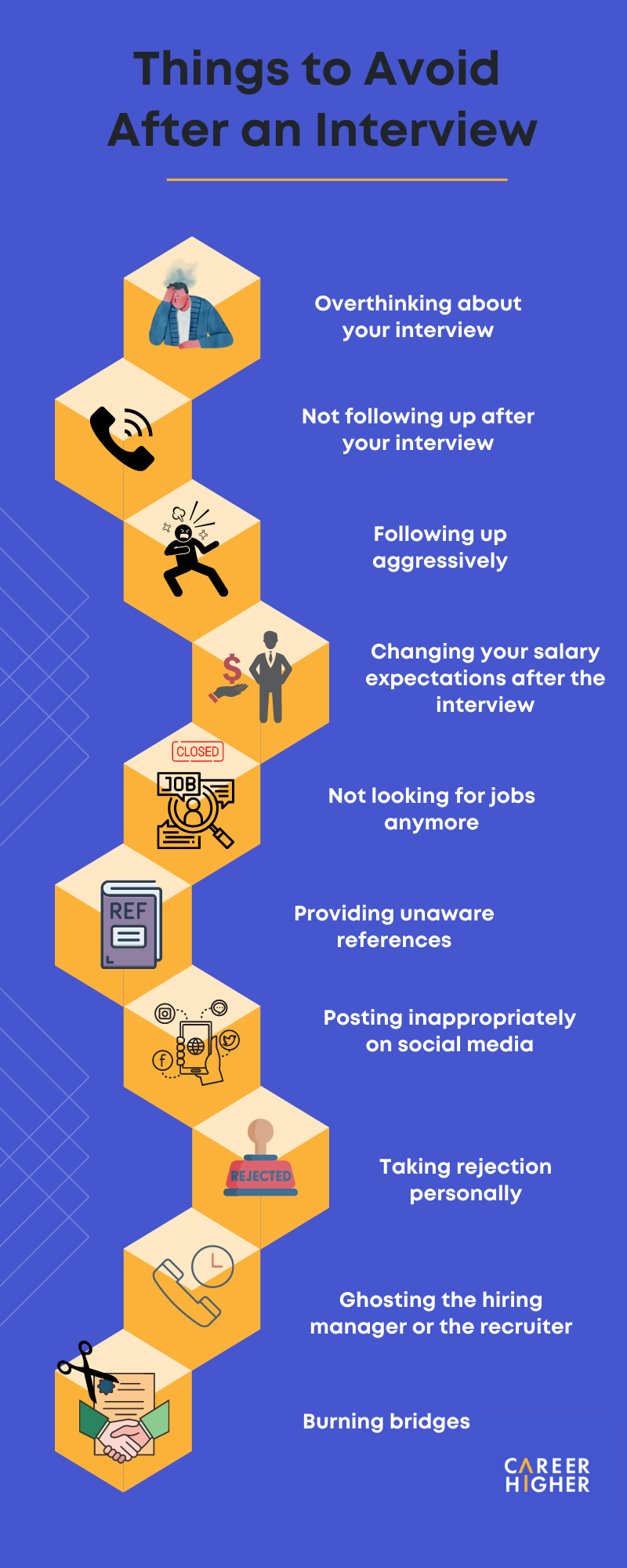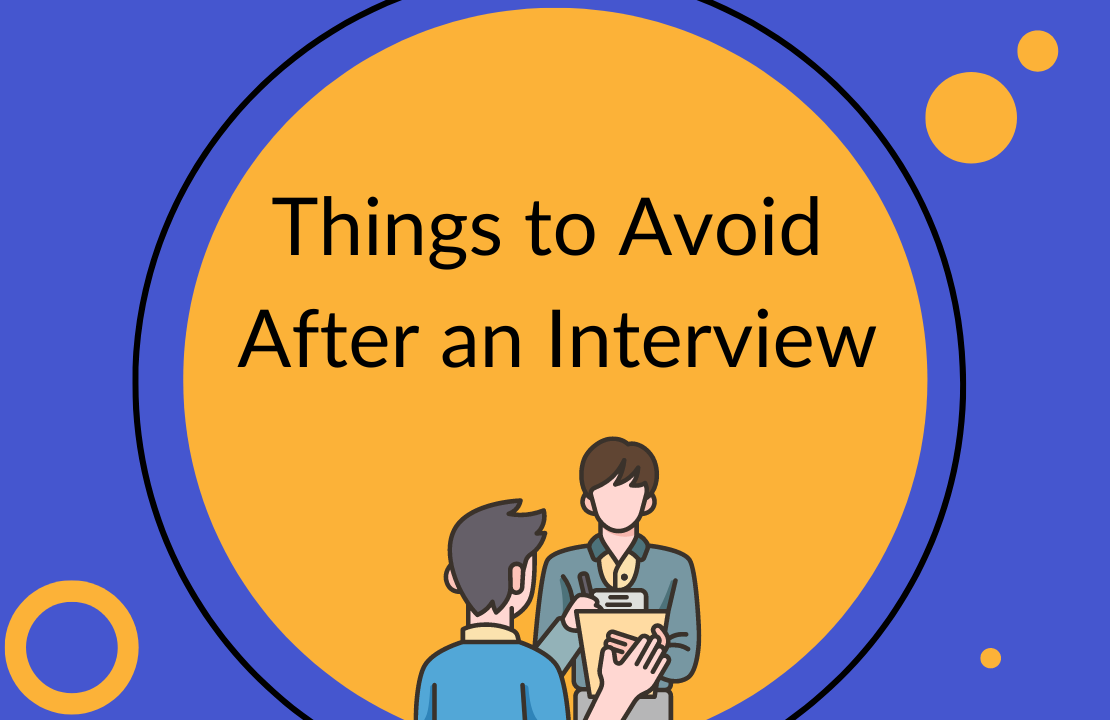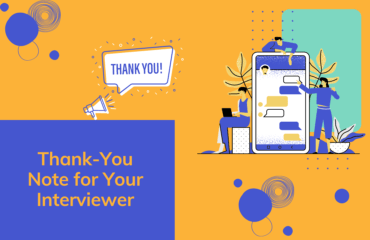Table of Contents
- 1) Overanalyzing the interview
- 2) Not following up after an interview
- 3) Following up aggressively
- 4) Changing salary expectations after an interview
- 5) Quitting your job search
- 6) Providing a list of unaware references
- 7) Making inappropriate social media posts
- 8) Taking rejection personally
- 9) Ghosting the hiring manager
- 10) Burning bridges
Rocking your job interview can be a challenge. In fact, a study revealed that candidates who interview for a role only have an average of 20% to secure a job offer. Hence, staying on the top of your game is essential to boost your chances of landing your dream role.
Apart from searching everything there is to know about the things you should do right, knowing what not to do after an interview should also be part of your job interview preparation. This helps you keep aware of the things you need to avoid that can sabotage your success. If you are not aware of what they are, keep reading, as we will share some of the key things you should not do after an interview.
1) Overanalyzing the interview
Evaluating how your interview went can be helpful in identifying and addressing your opportunities for improvement. However, it’s a different story if you keep overthinking what you could have done better. As with anything in life, too much of something can be bad for you. Overthinking can cause a lot of unnecessary worry post-interview.
If there are signs that the interview did not go well, do not beat yourself up. While this can be hard not to worry yourself over, try diverting your attention elsewhere and keep yourself busy while waiting for the result. Do something you enjoy and can distract your mind from the negative interview thoughts. Some examples may include playing your favorite sport, going out with friends, or watching a movie.
2) Not following up after an interview
Is it okay to reach out after an interview? Absolutely! According to a survey, more than 20% of hiring managers would dismiss candidates who didn’t send a thank-you note after an interview. Failing to follow up demonstrates a lack of commitment and interest in the position. So, make sure to send a thank-you note to maximize the probability of you getting an offer. Use this opportunity to convey your appreciation for the time you’ve spent with your potential employer. Apart from this, reiterate why you’re a good fit for the role based on your discussions during the interview.
3) Following up aggressively
While following up after an interview is essential, it needs to be done strategically. Before you leave the interview, make sure to ask the interviewer when they can anticipate making a hiring decision. Knowing this information can help you properly time your follow-up attempts. While the follow-up process will vary depending on your specific situation, one or two follow-ups about a week apart are typically sufficient. Following up too aggressively may create a perception that you are desperate and impatient, impacting the outcome of your application.
4) Changing salary expectations after an interview
In some cases, interviewers may ask about your salary requirements during an interview. This allows them to determine what you need and whether you fit into the company’s overall compensation range. If you have already quoted a range, stick to your words. No matter how positively you feel about the interview, avoid being overly confident by sending a note with higher salary demand after an interview. It will not only make you look unprofessional, but it can also cost you your dream job.
5) Quitting your job search
Though you think you may have interviewed for a job that seemed like a perfect fit for you, that does not mean you should stop your job search. Keep in mind that an interview does not guarantee a job offer. So, if you have not been offered and accepted the position, the game is not yet over. While you are waiting to hear back from your potential employer, keep looking. This will help keep your mind busy and ensures you have a backup in case things don’t work as expected.
6) Providing a list of unaware references
According to a report, 37% of recruiters consider references as one of the most important factors when evaluating candidates. Hence, having the right people to endorse your skills, work ethic, and experience can be critical in landing your dream job. So, before providing your references’ contact information, make sure to ask permission first. Share the job description for them to gain a thorough understanding of the position you’re looking for. This will allow them to provide a relevant recommendation, which can boost your credibility.
Some employers use social media to learn more about job candidates. This means anything you post may impact their decision to move forward with you. While everyone is free to express opinions online, you need to be careful with what you post. Some of the things you need to look out for include negative remarks and confidential company data and employment terms. If you are not sure whether your post will be seen in poor taste or not, it’s best to keep your thoughts private. As they say, it’s better to be safe than sorry.
8) Taking rejection personally
Rejection is never a pleasant experience. It can feel personal, especially if it’s your dream job that is at stake. However, being rejected for a job doesn’t necessarily mean you did something wrong or are not good enough. In most cases, rejections have more to do with the company than with the candidate. It could be that the company’s needs have changed, or there are stronger applicants for the position. So, you shouldn’t take it personally.
9) Ghosting the hiring manager
Ghosting is when you go dark on the hiring manager as the hiring process progresses by suddenly withdrawing from all communication without explanation. It is considered being unprofessional and could tarnish your reputation as a professional. If you no longer wish to continue with the process for whatever reason, it is always best to inform the hiring team. This shows you respect them, which they will surely appreciate.
10) Burning bridges
Regardless of the outcome of the interview, always remain professional. It is essential to maintain positive relationships as it can be beneficial in your job search and long-term career. Even if you feel like you’re not treated well or the interview didn’t go in a positive direction, never send an angry email or cyberbully the hiring manager. No matter how tempting it can be, don’t burn bridges in any way. This can have negative effects on your ability to find future work.

When you are applying for a job, the hiring team does not only evaluate your work experience, skills, and educational background. While there are many factors that can impact hiring decisions, your behavior after the interview can also affect your chances of landing the job. Hence, being aware of the things you should not do is imperative.





